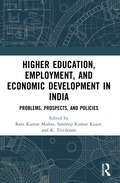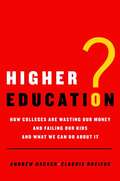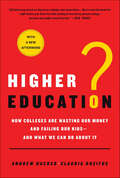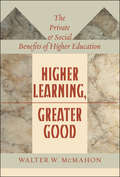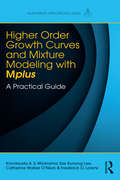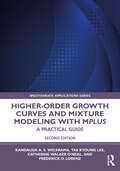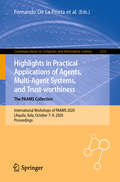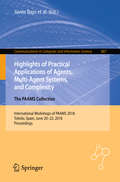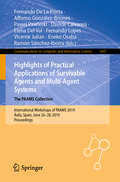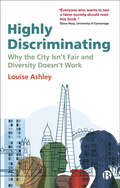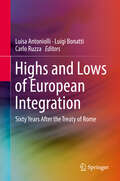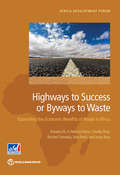- Table View
- List View
Higher Education, Employment, and Economic Development in India: Problems, Prospects, and Policies
by Ram Kumar Mishra, Sandeep Kumar Kujur, and K. TrivikramThis volume examines the role of higher education and employment in economic development in emerging economies like India. It looks at the contours of higher education policies and the labour market dynamics to explore ways to address joblessness and income disparity. The book discusses themes such as quality and access to higher education, the shift towards private investment in higher education, demographic dividend and joblessness among youth, social and income inequalities, labour migration and employment, and the participation of women in the workforce, among others. It provides insights into the challenges relating to employment generation in the industrial sector. It also offers solutions and policy measures to move towards sustainable growth, better employment opportunities in various sectors of industries, and human development. Rich in empirical data, this volume will be of interest to students and researchers of education, economics, development studies, sociology, gender studies, and social and economic policy.
Higher Education: On Life, Landing a Job, and Everything Else They Didn't Teach You in College
by Kenneth JeddingToday's college grads face a new set of challenges brought on by a sluggish job market, changing technology, and staggering amounts of debt. The rules have changed since their parents were in school, leaving young adults at a loss for advice that addresses their immediate concerns as well as the big-picture questions with which each generation of young adults must contend.Life coach Ken Jedding has spent the past decade talking one-on-one with college students and graduates across the country in his workshops and lectures. In Higher Education, he provides a fresh, modern guidebook to postcollegiate life that addresses the issues and concerns he hears voiced most often. From the lofty What is my purpose in life? and the practical How can I land my dream job? to the increasingly common (if somewhat terrifying) How did I wind up back in my parents' house?, Jedding's valuable insight, wisdom, and humor provide a much-needed roadmap for the journey that is only just beginning.
Higher Education: Progress for Management and Engineering (Higher Education and Sustainability)
by Carolina MachadoIncreasing corporate social responsibility demands professionals possess the necessary knowledge, abilities, and competencies to answer the needs of a diverse organization’s stakeholders. This book highlights the most recent issues related to higher education in the fields of management and engineering. It explains why a sustainable education is a requirement for professionals, as well as the organizations they collaborate with.Higher Education: Progress for Management and Engineering focuses on the latest research findings in the field of higher and sustainable education. It discusses the progress, shares knowledge and insights on an international scale, and highlights the challenges faced to obtain and secure a more responsible and sustainable management system. Selecting different options and strategies, how to set priorities on managing competition, and how to succeed as an organization that can lead to successes in both national and international markets are covered within this book.This book can be used as a reference for researchers, academics, managers, engineers, and other professionals involved in higher and sustainable education in management and engineering.
Higher Education? How Colleges Are Wasting Our Money and Failing Our Kids and What We Can Do about It
by Andrew Hacker Claudia DreifusThe authors make an incisive case that the American way of higher education, now a costliest business, has lost sight of its primary mission: the education of young adults. They call for a thorough overhaul of a self-indulgent system and take readers on a road trip from Princeton to Evergreen State to Florida Gulf Coast University, revealing those faculties and institutions that are getting it right and proving that teaching and learning can be achieved; and at a much more reasonable price.
Higher Education?: How Colleges Are Wasting Our Money and Failing Our Kids—and What We Can Do About It
by Andrew Hacker Claudia DreifusWhat's gone wrong at our colleges and universities—and how to get American higher education back on track A quarter of a million dollars. It's the going tab for four years at most top-tier universities. Why does it cost so much and is it worth it? Renowned sociologist Andrew Hacker and New York Times writer Claudia Dreifus make an incisive case that the American way of higher education, now a $420 billion-per-year business, has lost sight of its primary mission: the education of young adults. Going behind the myths and mantras, they probe the true performance of the Ivy League, the baleful influence of tenure, an unhealthy reliance on part-time teachers, and the supersized bureaucracies which now have a life of their own. As Hacker and Dreifus call for a thorough overhaul of a self-indulgent system, they take readers on a road trip from Princeton to Evergreen State to Florida Gulf Coast University, revealing those faculties and institutions that are getting it right and proving that teaching and learning can be achieved—and at a much more reasonable price.
Higher Expectations: How to Survive Academia, Make it Better for Others, and Transform the University
by Leslie Kern Roberta HawkinsHigher Expectations is a practical guide to navigating academia for people who want to improve their own day-to-day work lives and create better conditions for everyone. Universities are broken: they’re built on systems that are discriminatory, hierarchical, and individualistic. This hurts the people that work and learn in them and limits the potential for universities to contribute to a better world. But we can raise our expectations. Hawkins and Kern envision a university transformed by collaboration, care, equity, justice, and multiple knowledges. Drawing on real-world, international examples where people and institutions are already doing things in new ways, Higher Expectations offers concrete advice on how to make these transformations real. It covers many areas of academic life including course design, conferencing, administration, research teams, managing workloads and more. Designed for faculty, graduate students, postdoctoral researchers, and other scholars, Higher Expectations delivers hope and practical actions you can take to start making change now. It is a must-have for everyone working in academia today.
Higher Ground: New Hope for the Working Poor and Their Children
by Greg J. Duncan Aletha C. Huston Thomas S. WeisnerDuring the 1990s, growing demands to end chronic welfare dependency culminated in the 1996 federal “welfare-to-work” reforms. But regardless of welfare reform, the United States has always been home to a large population of working poor—people who remain poor even when they work and do not receive welfare. In a concentrated effort to address the problems of the working poor, a coalition of community activists and business leaders in Milwaukee, Wisconsin, launched New Hope, an experimental program that boosted employment among the city’s poor while reducing poverty and improving children’s lives. In Higher Ground, Greg Duncan, Aletha Huston, and Thomas Weisner provide a compelling look at how New Hope can serve as a model for national anti-poverty policies. New Hope was a social contract—not a welfare program—in which participants were required to work a minimum of thirty hours a week in order to be eligible for earnings supplements and health and child care subsidies. All participants had access to career counseling and temporary community service jobs. Drawing on evidence from surveys, public records of employment and earnings, in-depth interviews, and ethnographic observation, Higher Ground tells the story of this ambitious three-year social experiment and evaluates how participants fared relative to a control group. The results were highly encouraging. Poverty rates declined among families that participated in the program. Employment and earnings increased among participants who were not initially working full-time, relative to their counterparts in a control group. For those who had faced just one significant barrier to employment (such as a lack of access to child care or a spotty employment history), these gains lasted years after the program ended. Increased income, combined with New Hope’s subsidies for child care and health care, brought marked improvements to the well-being and development of participants’ children. Enrollment in child care centers increased, and fewer medical needs went unmet. Children performed better in school and exhibited fewer behavioral problems, and gains were particularly dramatic for boys, who are at the greatest risk for poor academic performance and behavioral disorders. As America takes stock of the successes and shortcomings of the Clinton-era welfare reforms, the authors convincingly demonstrate why New Hope could be a model for state and national policies to assist the working poor. Evidence based and insightfully written, Higher Ground illuminates how policymakers can make work pay for families struggling to escape poverty.
Higher Learning, Greater Good: The Private and Social Benefits of Higher Education
by Walter W. McMahonThe chronic underinvestment in higher education has serious ramifications for both individuals and society.Winner, Best Book in Education, 2009 PROSE Awards, Professional and Scholarly Publishing Division, Association of American PublishersWinner, Best Book in Education, PROSE Awards, Professional and Scholarly Publishing Division, Association of American PublishersA college education has long been acknowledged as essential for both personal success and economic growth. But the measurable value of its nonmonetary benefits has until now been poorly understood. In Higher Learning, Greater Good, leading education economist Walter W. McMahon carefully describes these benefits and suggests that higher education accrues significant social and private benefits. McMahon's research uncovers a major skill deficit and college premium in the United States and other OECD countries due to technical change and globalization, which, according to a new preface to the 2017 edition, continues unabated. A college degree brings better job opportunities, higher earnings, and even improved health and longevity. Higher education also promotes democracy and sustainable growth and contributes to reduced crime and lower state welfare and prison costs. These social benefits are substantial in relation to the costs of a college education. Offering a human capital perspective on these and other higher education policy issues, McMahon suggests that poor understanding of the value of nonmarket benefits leads to private underinvestment. He offers policy options that can enable state and federal governments to increase investment in higher education.
Higher Life Design: Arriving at Your Intended Destination Healthy, Wealthy, and Happy
by Jefferson SantosI walked down the sidewalk on my way to the mailbox fearing the worst. Rather than a friend, the mailbox seemed more like an assassin. Its favorite target? My pride. My future. And most devastating - my credit score. I wasn’t financially irresponsible, but then again Donald Trump wasn’t sitting at my feet to learn any tips about money management either. Truth is I was broke. Worse than that, I was broke and in the hole. Yep. Twenty-three years old, $70K in debt, and living with my mom in her apartment. I was the essence of a self-made man. Except that I hadn’t made anything yet and I definitely didn’t feel like a man at the moment. Despite a large amount of entrepreneurial ambition for my new business start-up, life had me in a choke hold and I felt close to tapping out. Life held Author Jefferson Santos up against the ropes until he discovered the answer, the 7 steps that now make up the "Higher Life Design". Today a competent and confident entrepreneur, Jefferson earns over 7 figures. A quarter of a million strong, his international team grows daily. He’s trained teams from A to Z from Amsterdam to Zimbabwe and everywhere else in between. His house and car are both paid for by his company and in the past 84 months he’s taken 107 vacations. In this transformational book Jefferson will show you the 7 step model that changed his life. What if you had vibrant health, abundant wealth, and unending happiness? What if you got the exact results you wanted? Think it’s too good to be true? Think again. Think Higher Life Design.
Higher-Order Growth Curves and Mixture Modeling with Mplus: A Practical Guide (Multivariate Applications Series)
by Kandauda K.A.S. Wickrama Tae Kyoung Lee Catherine Walker O’Neal Frederick O. LorenzThis practical introduction to second-order and growth mixture models using Mplus introduces simple and complex techniques through incremental steps. The authors extend latent growth curves to second-order growth curve and mixture models and then combine the two. To maximize understanding, each model is presented with basic structural equations, figures with associated syntax that highlight what the statistics mean, Mplus applications, and an interpretation of results. Examples from a variety of disciplines demonstrate the use of the models and exercises allow readers to test their understanding of the techniques. A comprehensive introduction to confirmatory factor analysis, latent growth curve modeling, and growth mixture modeling is provided so the book can be used by readers of various skill levels. The book’s datasets are available on the web. Highlights include: -Illustrative examples using Mplus 7.4 include conceptual figures, Mplus program syntax, and an interpretation of results to show readers how to carry out the analyses with actual data. -Exercises with an answer key allow readers to practice the skills they learn. -Applications to a variety of disciplines appeal to those in the behavioral, social, political, educational, occupational, business, and health sciences. -Data files for all the illustrative examples and exercises at www.routledge.com/9781138925151 allow readers to test their understanding of the concepts. -Point to Remember boxes aid in reader comprehension or provide in-depth discussions of key statistical or theoretical concepts. Part 1 introduces basic structural equation modeling (SEM) as well as first- and second-order growth curve modeling. The book opens with the basic concepts from SEM, possible extensions of conventional growth curve models, and the data and measures used throughout the book. The subsequent chapters in part 1 explain the extensions. Chapter 2 introduces conventional modeling of multidimensional panel data, including confirmatory factor analysis (CFA) and growth curve modeling, and its limitations. The logical and theoretical extension of a CFA to a second-order growth curve, known as curve-of-factors model (CFM), are explained in Chapter 3. Chapter 4 illustrates the estimation and interpretation of unconditional and conditional CFMs. Chapter 5 presents the logical and theoretical extension of a parallel process model to a second-order growth curve, known as factor-of-curves model (FCM). Chapter 6 illustrates the estimation and interpretation of unconditional and conditional FCMs. Part 2 reviews growth mixture modeling including unconditional growth mixture modeling (Ch. 7) and conditional growth mixture models (Ch. 8). How to extend second-order growth curves (curve-of-factors and factor-of-curves models) to growth mixture models is highlighted in Chapter 9. Ideal as a supplement for use in graduate courses on (advanced) structural equation, multilevel, longitudinal, or latent variable modeling, latent growth curve and mixture modeling, factor analysis, multivariate statistics, or advanced quantitative techniques (methods) taught in psychology, human development and family studies, business, education, health, and social sciences, this book’s practical approach also appeals to researchers. Prerequisites include a basic knowledge of intermediate statistics and structural equation modeling.
Higher-Order Growth Curves and Mixture Modeling with Mplus: A Practical Guide (Multivariate Applications Series)
by Tae Kyoung Lee Catherine Walker O’Neal Frederick O. Lorenz Kandauda A.S. WickramaThis practical introduction to second-order and growth mixture models using Mplus introduces simple and complex techniques through incremental steps. The authors extend latent growth curves to second-order growth curve and mixture models and then combine the two using normal and non-normal (e.g., categorical) data. To maximize understanding, each model is presented with basic structural equations, figures with associated syntax that highlight what the statistics mean, Mplus applications, and an interpretation of results. Examples from a variety of disciplines demonstrate the use of the models and exercises allow readers to test their understanding of the techniques. A comprehensive introduction to confirmatory factor analysis, latent growth curve modeling, and growth mixture modeling is provided so the book can be used by readers of various skill levels. The book’s datasets are available on the web. New to this edition: * Two new chapters providing a stepwise introduction and practical guide to the application of second-order growth curves and mixture models with categorical outcomes using the Mplus program. Complete with exercises, answer keys, and downloadable data files. * Updated illustrative examples using Mplus 8.0 include conceptual figures, Mplus program syntax, and an interpretation of results to show readers how to carry out the analyses with actual data. This text is ideal for use in graduate courses or workshops on advanced structural equation, multilevel, longitudinal or latent variable modeling, latent growth curve and mixture modeling, factor analysis, multivariate statistics, or advanced quantitative techniques (methods) across the social and behavioral sciences.
Higher: 100 Years of Boeing
by Russ BanhamOver the course of a century, the Boeing Company has grown from a small outfit operating out of a converted boathouse--producing a single pontoon plane made from canvas and wood--into the world's largest aerospace company. The thrilling story of the celebrated organization is one filled with ambition, ingenuity, and a passion to exceed expectations. In this lavishly illustrated book, published to coincide with Boeing's 100th anniversary, Pulitzer Prize-nominated author Russ Banham recounts the tale of a company and an industry like no other--one that has put men on the moon, defended the free world, and changed the way we live.
Highland Park Wood Company (Abridged)
by David E. BellA major home builder wishes to purchase lumber (Southern pine). The builder wants delivery in six months but prefers to lock-in the price near current rates. The lumber wholesaler must decide on a pricing and sourcing strategy. Examples include: 1) buy & hold, 2) wait and see, and 3) hedge with futures. There is no futures market in Southern pine, but there is a market in Hem-Fir (a somewhat similar wood). Data on historical spot and futures prices is provided.
Highlands' Garden Village
by Arthur I Segel Eve Bould Harry C. MidgleyIt was March 2003 and Chuck Perry was awaiting the arrival of his New York-based business partner, Jonathan Rose. He and Rose had begun Highlands' Garden Village, their latest mixed-use, mixed-income development project. In 1996, they had optioned the unused Elitch Gardens amusement park site and since then had transformed the site into a traditional neighborhood development that was now nearly complete. The amusement park rides had been dismantled and replaced with apartments, homes, and two acres of open space. The project's pro formas were positive and the residential units were fully sold.
Highlights in Practical Applications of Agents, Multi-Agent Systems, and Trust-worthiness. The PAAMS Collection: International Workshops of PAAMS 2020, L'Aquila, Italy, October 7–9, 2020, Proceedings (Communications in Computer and Information Science #1233)
by Vicente Julian Fernando Lopes Philippe Mathieu Elena Del Val Fernando De La Prieta Alia El Bolock Jaime Andrés Rincón Arango Jaume Jordán Prunera João Carneiro Rubén FuentesThis book constitutes the refereed proceedings of the workshops co-located with the 18th International Conference on Practical Applications of Agents and Multi-Agent Systems, PAAMS 2020, held in L’Aquila, Italy, in October 2020. The total of 21 full and 13 short papers presented in this volume were carefully reviewed and selected from 57 submissions. The papers in this volume stem from the following meetings: Workshop on Agent-Based Artificial Markets Computational Economics (ABAM); Workshop on Agents and Edge-AI (AgEdAI); Workshop on Character Computing (C2); Workshop on MAS for Complex Networks and Social Computation (CNSC); Workshop on Decision Support, Recommendation, and Persuasion in Artificial Intelligence (DeRePAI); Workshop on Multi-Agent Systems and Simulation (MAS&S); Workshop on Multi-agent based Applications for Energy Markets, Smart Grids and Sustainable Energy Systems (MASGES); Workshop on Smart Cities and Intelligent Agents (SCIA).
Highlights of Practical Applications of Agents, Multi-Agent Systems, and Complexity: International Workshops of PAAMS 2018, Toledo, Spain, June 20–22, 2018, Proceedings (Communications in Computer and Information Science #887)
by Javier Bajo Sylvain Giroux Patrycja Hoffa-Dąbrowska Vicente Julián Nayat Sánchez-Pi Rainer Unland Ricardo Azambuja Silveira Philippe Mathieu Elena Del Val Juan M. Corchado Elena María Navarro Martínez Eneko Osaba Icedo Alberto Fernández Rubén Fuentes-Fernández Antonio J. M. CastroThis book constitutes the refereed proceedings of the 11 workshops co-located with the 16th International Conference on Practical Applications of Agents and Multi-Agent Systems, PAAMS 2018, held in Toledo, Spain, in June 2018. The 47 full papers presented were carefully reviewed and selected from 72 submissions. The volume presents the papers that have been accepted for the following workshops: Workshop on Agents and Multi-agent Systems for AAL and e-HEALTH; Workshop on Agent based Applications for Air Transport; Workshop on Agent-based Artificial Markets Computational Economics; Workshop on Agent-Based Solutions for Manufacturing and Supply Chain; Workshop on MAS for Complex Networks and Social Computation; Workshop on Intelligent Systems and Context Information Fusion; Workshop on Multi-agent based Applications for Energy Markets, Smart Grids and Sustainable Energy Systems; Workshop on Multiagent System based Learning Environments; Workshop on Smart Cities and Intelligent Agents; Workshop on Swarm Intelligence and Swarm Robotics; Workshop on Multi-Agent Systems and Simulation.
Highlights of Practical Applications of Cyber-Physical Multi-Agent Systems: International Workshops of PAAMS 2017, Porto, Portugal, June 21-23, 2017, Proceedings (Communications in Computer and Information Science #722)
by Javier Bajo, Zita Vale, Kasper Hallenborg, Ana Paula Rocha, Philippe Mathieu, Pawel Pawlewski, Elena Del Val, Paulo Novais, Fernando Lopes, Nestor D. Duque Méndez, Vicente Julián and Johan HolmgrenThis book constitutes the refereed proceedings of the nine workshops co-located with the 15th International Conference on Practical Applications of Agents and Multi-Agent Systems, PAAMS 2017, held in Porto, Portugal, in June 2017.The 41 full papers presented were carefully reviewed and selected from 80 submissions. The volume presents the papers that have been accepted for the following workshops: Workshop on Agent based Applications for Air Transport and Application of Agents to Passenger Transport; Workshop on Agent-based Artificial Markets Computational Economics; Workshop on Agents and Multi-agent Systems for AAL and e-HEALTH; Workshop on Agent-Based Solutions for Manufacturing and Supply Chain; Workshop on MAS for Complex Networks and Social Computation; Workshop on Decision Making in Dynamic Information Environments; Workshop on Multi-agent based Applications for Smart Grids and Sustainable Energy Systems; Workshop on Multiagent System based Learning Environments; Workshop on Smart Cities and Intelligent Agents.
Highlights of Practical Applications of Survivable Agents and Multi-Agent Systems. The PAAMS Collection: International Workshops of PAAMS 2019, Ávila, Spain, June 26–28, 2019, Proceedings (Communications in Computer and Information Science #1047)
by Vicente Julian Fernando Lopes Eneko Osaba Elena Del Val Fernando De La Prieta Alfonso González-Briones Pawel Pawleski Davide Calvaresi Ramón Sánchez-IborraThis book constitutes the refereed proceedings of the workshops and special session co-located with the 17th International Conference on Practical Applications of Agents and Multi-Agent Systems, PAAMS 2019, held in Ávila, Spain, in June 2019.The total of 26 full and 8 short papers presented in this volume were carefully reviewed and selected from 47 submissions. The book also contains extended abstracts of the doctoral consortium contributions. The papers in this volume stem from the following meetings: Workshop on Agents-Based Solutions for Manufacturing and Supply Chain, AMSC; Second International Workshop on Blockchain Technology for Multi-Agent Systems, BTC4MAS; Workshop on MAS for Complex Networks and Social Computation; CNSC; Workshop on Multi-Agent Based Applications for Energy Markets, Smart Grids and Sustainable Energy Systems, MASGES; Workshop on Smart Cities and Intelligent Agents, SCIA; and Workshop on Swarm Intelligence and Swarm Robotics, SISR; as well as the special session on Software Agents and Virtualization for Internet of Things, SAVIoTS.
Highly Desirable: Tales of London’s super-prime property from the Secret Agent
by AnonymousA professional confessional like no other, The Secret Agent plunges us into the face-paced, high-stakes and glamorous world of London's super-prime property business.Spanning the course of a year, Max - the alias of London's most exclusive property agent - guides us through the unimaginable highs and bank-breaking lows of his business, where houses sell for up to £170 million and discretion is key.With a client list that includes a Booker Prize winner, several Oscar nominees, a stadium-filling musician, an HRH, two national treasures, a supermodel, a Duke, a Duchess, and untold FTSE board members and titans of business, there is never a dull moment for Max and his team - John, Damien and Nicola - as they negotiate both huge property deals in the office, and their complex personal lives outside of it.Offering an insider's view into the hidden machinations of this exclusive market, The Secret Agent sees Max attempt to balance his team, his own needs and, of course, the books against his ever-demanding clients, as he showcases the good, the bad, and the downright bizarre nature of the real-estate market of the super-rich.(P) 2023 Headline Publishing Group Ltd
Highly Desirable: Tales of London’s super-prime property from the Secret Agent
by AnonymousSpanning the course of a year, Max - the alias of London's most exclusive property agent - guides us through the unimaginable highs and bank-breaking lows of his business, where houses sell for up to £170 million and discretion is key.With a client list that includes a Booker Prize winner, several Oscar nominees, a stadium-filling musician, an HRH, two national treasures, a supermodel, a Duke, a Duchess, and untold FTSE board members and titans of business, there is never a dull moment for Max and his team - John, Damien and Natasha - as they negotiate both huge property deals in the office, and their complex personal lives outside of it.Offering an insider's view into the hidden machinations of this exclusive market, Highly Desirable sees Max attempt to balance his team, his own needs and, of course, the books against his ever-demanding clients, as he showcases the good, the bad, and the downright bizarre nature of the real-estate market of the super-rich.
Highly Discriminating: Why the City Isn’t Fair and Diversity Doesn’t Work
by Louise AshleyWhy does the City of London, despite an apparent commitment to recruitment and progression based on objective merit within its hiring practices, continue to reproduce the status quo? Written by a leading expert on diversity and elite professions, this book examines issues of equality in the City, what its practitioners say in public and what they think behind closed doors. Drawing on research, interviews, practitioner literature and internal reports, it argues that hiring practices in the City are highly discriminating in favour of a narrow pool of affluent applicants, and future progress may only be achieved by the state taking a greater role in organizational life. It calls for a policy shift at both the organizational and governmental level to address the implications of widening inequality in the UK.
Highs and Lows of European Integration: Sixty Years After The Treaty Of Rome
by Carlo Ruzza Luisa Antoniolli Luigi BonattiIn light of Europe’s prolonged state of crisis, this book reassesses the challenges and prospects of the European integration process. Scholars from diverse disciplines reflect on various types of integration by analyzing political, economic and sociological variables, while also taking legal and cultural constraints into account. Readers will learn about the dilemmas and challenges of the European transformation process as well as political reforms to overcome these challenges. The book is divided into four parts, the first of which discusses the external dimension of the European Union, including a review of development aid policies and EU foreign policy. In turn, the second part focuses on institutional change and asymmetrical integration in the EU. The third part is devoted to the rise of populism and nationalism, including an analysis of the role of civil society organizations in the Brexit. In closing, the last part highlights the crisis of the Euro as a symbol of European integration and the emerging social and economic divide between countries of the North and South.
Highway Heist: America's Crumbling Infrastructure and the Road Forward
by James T. BennettIn this eye-opening book, Professor James Bennett guides readers through centuries of one of the most underrated yet widely used aspects of American life—roads.Relying on history and economic data—and with a humorous and oftentimes sharp tongue—Bennett explains how important America's highways and byways have been to everything from policymaking to everyday life. Crafting America's roads took persuasion, planning—and more taxes than any politician could have dreamed of. And far too often their realization, thanks, in Bennett's view, to flawed interpretations of the power of eminent domain, required destruction, sometimes on a massive scale, of long-established neighborhoods and important cityscapes. Likewise, the upkeep of America's highways has been the center of many a policy battle, waged by Republicans and Democrats alike. Yes, we all want roads in good working condition—but just how and who will pay for them remain contentious questions. Bennett argues persuasively that the road forward just might be a second, but more serious, sustained look at, and local experimentation with, private roads and toll roads.Agree or disagree with him, Bennett has written a significant contribution to America's ongoing debate about how her citizens should traverse, from "sea to shining sea," its fruited plain.
Highway to Empowerment: Frauen auf die Überholspur
by Bianka NilgesAls Fahrlehrerin und damit Frau in einem typischen Männerberuf und erfolgreiche Unternehmerin ruft Bianka Nilges vor allem jüngeren Frauen zu: Bewegt euch, kommt ins Handeln! Wir haben gerade in Deutschland die Neigung, Dinge unnötig kompliziert zu machen und so lange zu zögern, bis Stillstand herrscht. Dabei können Frauen heute alles schaffen, was sie wollen, wenn sie mit Herzblut dabei sind. Es gilt, jenseits aller Geschlechterklischees und Schubladen das zu finden, was einen glücklich macht - in einem Umfeld, das zu einem passt. Anhand ihrer eigenen Geschichte sowie mit vielen treffenden Alltagsbeobachtungen zeigt die Autorin, wie sich Hindernisse überwinden lassen und Female Empowerment praktisch möglich wird. Dabei blendet sie nicht aus, was sich gesellschaftlich noch ändern darf und wo wir uns aktuell in Deutschland möglicherweise in eine ungute Richtung bewegen. Ein Buch, das Mut macht, einzusteigen und loszufahren! Das Buch ist eine Mischung aus Karrierebuch, Gender-Buch und Buch zum Thema Persönlichkeitsentwicklung. Seinen besonderen Reiz bezieht es durch pointierte Storys aus der Welt der Fahrschule und des Fahrens - durch die Brille einer Frau, die schon so ziemlich alles gesehen hat, was einem auf und am Rande unserer Straßen begegnen kann.
Highways to Success or Byways to Waste
by John Nash A. Federico Barra Claudia Berg Rubaba Ali Jason Russ DamaniaRoads are the arteries through which the economy pulses. They connect sellers to markets, workers to jobs, students to education, and the sick to hospitals. Yet much of the developing world, Africa in particular, lacks adequate transportation infrastructure. Accordingly investments in transportation remain a cornerstone of the development agenda. Sub-Saharan Africa spends roughly $6.8 billion per year on paving roads, and the World Bank invests more on roads than on education, health, and social services combined. Despite the development focus on transportation, methodologies for evaluating which road projects to fund are often dis-jointed and unreliable. This report hopes to improve upon the current approaches by establishing a new methodology for prioritization which can be applied to a diverse set of scenarios, regions, and projects. This book demonstrates how modern econometrics and geospatial techniques can be combined to analyze the latest available geo-referenced datasets at the smallest possible scale to answer some of the most important questions in development. Uniquely this report attempts to shed light on some of the most profound puzzles in determining the impacts of roads and where to locate these. Does road infrastructure unleash a virtuous growth cycle? Is it advisable to improve roads in conflict prone zones? What is the effect of improving market access on farming practices? And what are the impacts of roads on forests and biodiversity? It is envisioned that the approach used in this book can be a reference guide to researchers from across the spectrum of international development, who are seeking new tools and insights into the many issues (technical and non-technical) of this important field.
